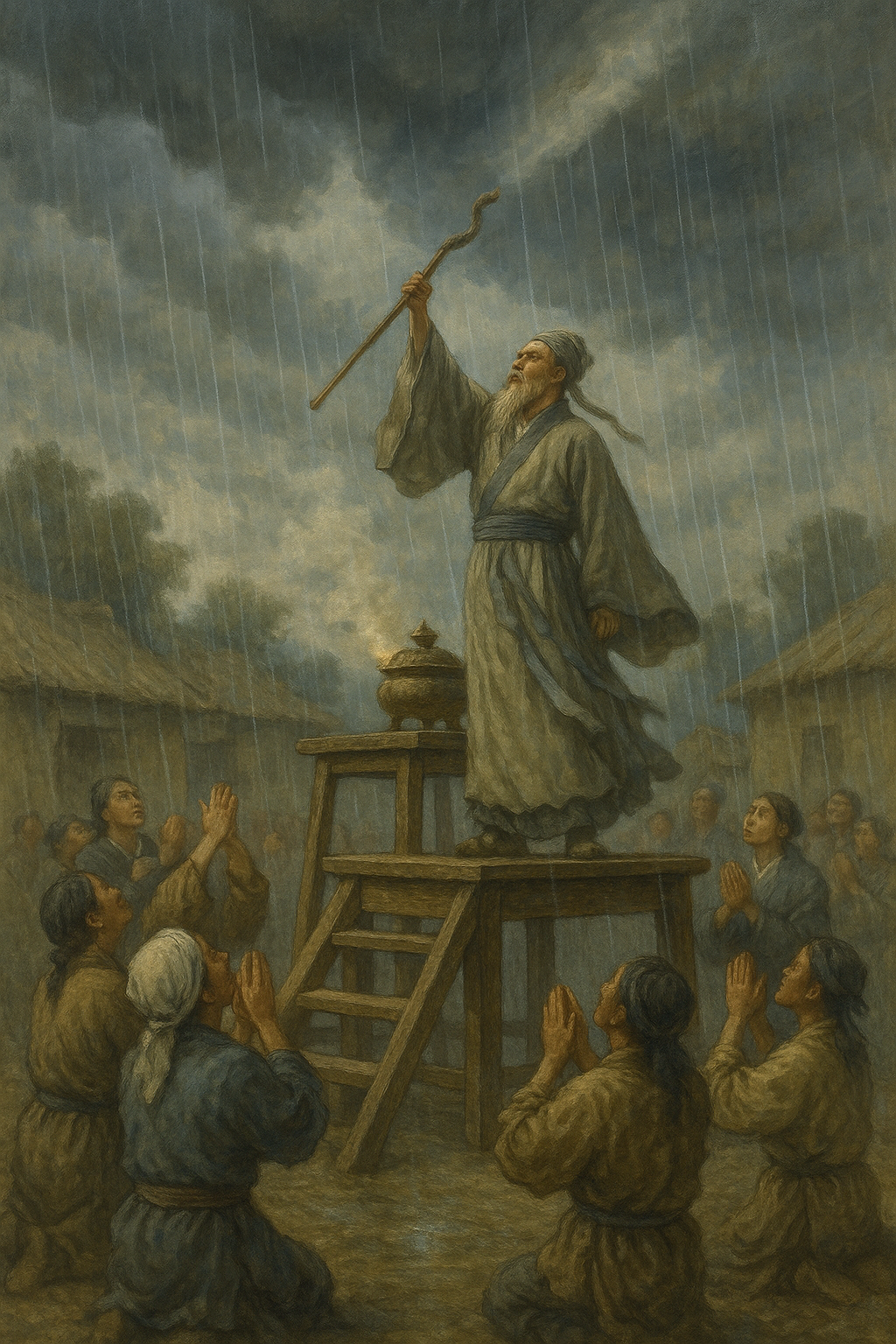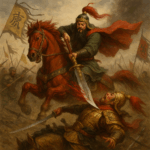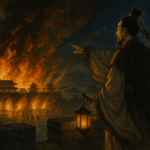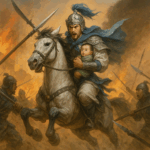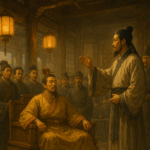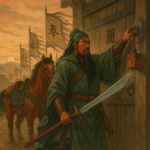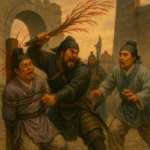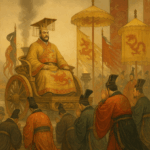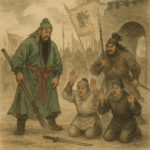Sun Ce had now firmly established his dominance over Jiangdong, his troops well-trained and provisions plentiful. In the fourth year of the Jian’an era, he struck at Lujiang, routed Liu Xun, and dispatched Yu Fan to deliver a proclamation to Yuzhang. There the Prefect Hua Xin promptly surrendered, and Sun Ce’s prestige soared. He then sent Zhang Hong to Xuchang to report his victories. When Cao Cao heard of Sun Ce’s growing power, he sighed, “This young lion is hard to contend with!” He accordingly gave his daughter to Sun Ce’s younger brother, Sun Kuang, binding the two families by marriage, and kept Zhang Hong on hand in Xuchang. When Sun Ce petitioned for the title of Grand Marshal, Cao Cao refused—a slight that stoked Ce’s resentment and made him ever yearn to seize Xuchang for himself.
Xu Gong, the Governor of Wu Commandery, secretly sent a missive to Cao Cao:
“Sun Ce is as daring as Xiang Ji. The court should honor him openly by summoning him to the capital; do not let him command the provinces, lest he become a future threat.”
But the letter, carried across the river, was intercepted by Sun Ce’s guards and brought to his camp. Reading it, Ce flew into a rage, executed the envoy, and feigned a summons for Xu Gong to discuss affairs. When Xu Gong arrived, Ce produced the intercepted petition and thundered, “Do you intend to send me to my death?” He then ordered Xu Gong strangled. His household scattered, though three of his retainers swore vengeance but lacked the chance.
One day, Sun Ce led a hunt in the western hills of Dantu, chasing a large stag into the forest. Suddenly he spied three men armed with spears and bows blocking his path. Drawing reins to halt his horse, he demanded, “Who are you?” They claimed to be soldiers under Han Dang, there to hunt deer. As Ce turned to ride on, one pressed his spear into his left leg. Startled, Ce drew his sword and struck from horseback—but the blade loosened in its sheath, and only the hilt remained in his grasp. Another already notched an arrow and struck Ce squarely on the cheek. He yanked it free, seized his bow, and fired back, killing one assailant. The other two raised their spears, crying, “We are Xu Gong’s retainers, come to avenge our lord!” With no other weapon, Ce parried their thrusts with his bow while retreating. Still they pressed him until he was wounded in several places and his horse also struck. At the brink of disaster, Cheng Pu and several soldiers arrived. At Ce’s shout of “Slay the traitors!” they charged in, cutting the attackers to pieces. They found Sun Ce, bloodied and grievously wounded; he was carried back to Wuhu to recuperate.
A poem arose in praise of Xu Gong’s three would-be avengers:
Ce’s cunning valor crowned the river’s brink,
In the hills he fell to cunning’s snare.
True to Xu Gong, these three gave all they had—
Their dying deed of loyalty, wondrous rare.
Though wounded, Sun Ce sent for Hua Lün to treat him, only to learn that the famed Hua Tuo had departed for the Central Plains, leaving his disciple. The disciple warned, “The arrowheads are laced with poison that has struck to the bone. You must rest for a hundred days without excitement, or you risk grave danger.” But Ce, by nature impatient, could not bear delay. After twenty days of care, he still burned with ambition—and when Zhang Hong’s envoy returned from Xuchang, Ce summoned him.
The messenger reported, “Cao Cao greatly fears Your Excellency; all his advisers respect you—only Guo Jia does not.” Ce demanded, “What did Guo Jia say?” Hesitant at first, the messenger then confessed, “He told Cao Cao that you are reckless, impulsive, and lacking in strategy—mere brute courage destined to be undone by guile.” At this Ce’s rage ignited anew: “How dare any man judge me! I swear I will take Xuchang!” He would not wait for his healing, but Zhang Zhao urged caution: “The physician bade you rest a hundred days. Why endanger your life for a moment’s anger?”
Before he could decide, an envoy from Yuan Shao, Chen Zhen, arrived with news that Yuan Shao sought alliance with Eastern Wu against Cao Cao. Overjoyed, Ce that very day held a banquet on the city tower for Chen Zhen. But as they drank, the assembled officers began whispering and descending the stairs. Puzzled, Ce asked why, and they answered, “A certain Celestial Immortal passes below—we wish to pay homage.”
Ce strode to the railing and saw a man in a crane-feathered cloak, staff in hand, standing in the street as commoners burned incense and kowtowed. Enraged, Ce cried, “Who is this charlatan? Seize him at once!” Told the man was Yu Ji, a wandering Taoist from Langya known for miraculous cures with talismanic water, Ce grew only more furious: “Arrest him or face execution!” Reluctantly his men brought Yu Ji before him on the tower. Ce thundered, “How dare you spread your barbarous sorcery!” Yu Ji replied calmly, “I am but a humble Taoist who found the divine Taiping Qingling Scripture by the Yangqu spring—a hundred volumes teaching remedies. I heal freely under Heaven’s mandate. How have I deceived anyone?” Ce spat, “You take nothing from the people—so how do you live? You are akin to Zhang Jiao himself. If not executed, you will be our ruin!” He ordered Yu Ji be beheaded, but Zhang Zhao interceded, “He has done no harm for decades. Spare him!” But Ce would not relent, and Yu Ji was cast into prison.
Learning of this, Lady Wu, Sun Ce’s mother, summoned him. “You would imprison a man who heals the sick and is revered by both soldiers and civilians?” she pleaded. “He is a demon who beguiles the masses,” Ce replied. Despite her tears, he refused mercy. So the jailers fettered Yu Ji, though they themselves admired him and had loosened his bonds until Ce’s rage returned. Zhang Zhao and dozens of others petitioned Ce to spare him, but he vowed, “I purge this evil to protect Jiangdong.”
Lu Fan suggested, “He can pray for rain—let him atone by ending our drought.” “Very well,” Ce snarled, and ordered Yu Ji to the city platform to summon rain. Yu Ji bathed, donned fresh robes, and bound himself in the sun. Crowds thronged the streets. “I ask for three feet of sweet rain to save the people,” he proclaimed. “Yet I shall not escape my fate.” As noon approached, Ce threatened, “If no rain falls by midday, burn him alive!” He had brushwood piled beneath the platform. As the hour tolled, fierce winds rose, thunder rolled, black clouds converged—yet no rain fell. Ce sneered, “A mere tantrum of clouds!” and gave the order to light the fire. Flames leapt about Yu Ji’s feet. Suddenly, a plume of black smoke soared on the wind, thunder cracked, and torrents of rain poured—streets ran like rivers three feet deep. Yu Ji lay serenely before the blaze, uttered a single cry, and the storm ceased, the sun reemerged. The crowd rushed to free him, unbinding his ropes and bowing in thanks. Incensed further, Ce drew his sword and shouted, “Rain and shine are Heaven’s alone—charlatans shall not claim them!” He commanded Yu Ji’s execution. The guards struck—Yu Ji’s head fell, and a wisp of azure qi drifted northeast. His body was displayed in the market as a warning.
That night the tempest raged, and at dawn Yu Ji’s head was gone. The guards reported this, and Ce, enraged, threatened to slay them all. Suddenly, a figure resembling Yu Ji walked calmly through the hall. Ce drew his sword to strike, but collapsed unconscious. Only after long ministrations did he revive. Lady Wu wailed, “You have killed a holy man—this is Heaven’s wrath.” Ce scoffed, “I have shed blood in battle—why should this night differ?” She pleaded for rituals to appease the gods, but Ce refused.
At the second watch, a chilling wind extinguished the lamp, then it relit. In its glow, Yu Ji’s ghost stood before his bed. Ce shouted, “I vowed to slay all sorcerers—begone!” He hurled his sword, but it passed through emptiness. Lady Wu, terrified, arranged secret rites to placate the spirits.
By daybreak, Ce, haggard and fearful, was carried to the Jade Pure Pavilion for prayers. There incense smoke coalesced into a canopy on which Yu Ji’s spirit sat. Ce spat and fled the hall. Outside, Yu Ji appeared at the gate, glaring. Ce called to his attendants, “Do you see this demon?” But none did. Enraged, he threw his sword into the crowd, accidentally slaying a minor officer. He ordered the shrine razed, but even amidst the flames Yu Ji’s figure was seen, unscathed. Disturbed and fearful, Ce abandoned the palace, camped outside the city, and summoned his generals, intent on aiding Yuan Shao against Cao Cao. His officers pleaded, “Your health forbids such haste—rest first.” That night Ce’s tent resounded with curses as he faced Yu Ji’s specter alone.
The next morning Lady Wu ordered him home. Pale and gaunt, Ce saw his reflection and fainted at the sight of Yu Ji’s image in the mirror. Convinced of the spirit’s power, he reluctantly agreed to proper rites. Once more he was taken to the Jade Pure Pavilion, where fresh ceremonies were held. Only then did his fever break, and he began to recover.
But fate’s wheel had turned against Sun Ce. His wounds, supernatural assaults, and unbridled fury combined to undermine his life force. Before long, illness overcame him, and he sensed his end. Summoning Zhang Zhao, Sun Quan, and his brothers, he entrusted the care of Jiangdong to his younger sibling:
“The realm lies in chaos. With our Wu forces and the Three Rivers as barriers, much may yet be done. Zhuge Jin, Zhou Yu, and others are able; I entrust the state to you, my brother. If either you or they falter, the house of Sun cannot stand.”
He took his seal and handed it to Sun Quan: “With this, govern our people. Rely on Zhang Zhao and Zhou Yu in matters of state. Remember the toil of our father and brother—bear this burden well.” His final breath left him at age twenty-six. A verse was later composed in his memory:
Alone he conquered southeastern lands—“Little Conqueror” all acclaimed.
Strategy like a crouching tiger, decisions swift as an eagle’s wing.
His rule pacified the Three Rivers’ flow, his fame spread across the realm.
On his deathbed he bequeathed all to Zhou Yu—his single steadfast aim.
Sun Quan wept at his brother’s bedside. Zhang Zhao urged, “Grieve and govern in equal measure.” Sun Quan composed himself, conducted the funeral rites, and assumed leadership, with Zhang Hong and others guiding the transition. When Zhou Yu returned from his post at Ba Qiu and learned of Sun Ce’s death, he wept at the funeral pyre and vowed loyalty, “I will serve with all my heart, even unto death.” Though shaken by his brother’s loss, Sun Quan found solace in capable ministers.
Meanwhile, Cao Cao, upon hearing of Sun Ce’s demise, resolved to press southward. But the imperial censor Zhang Hong counselled restraint: “To attack a fallen foe is neither righteous nor prudent. Better to treat Sun Quan kindly and turn a grudging ally.” Cao Cao took his advice, naming Sun Quan General and Governor of Kuaiji, and dispatched Zhang Hong to convey the seal. Thus Sun Quan, though young, took the reins of power in Jiangdong, the realm trembling on the brink of fresh war.
With southern strife yet at rest, the drums of northern battle beat anew. What fate awaits the realm? The answer lies ahead.
